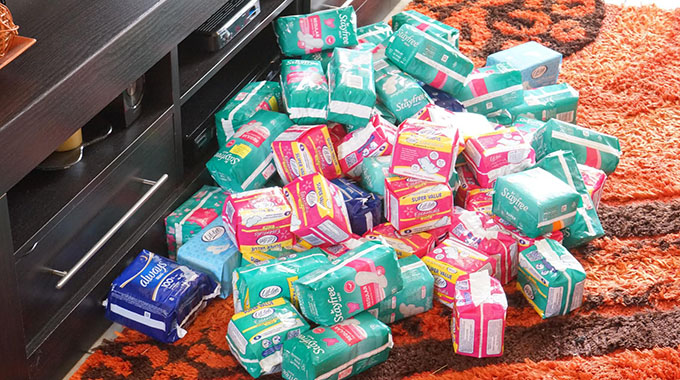Why menstrual health matters

Roselyne Sachiti
LAST Thursday, Zimbabwe’s First Lady Auxillia Mnangagwa was assigned a new task, that of becoming an ambassador of an American organisation Days for Girls.
The appointment was in recognition of the work she has been doing to alleviate various challenges faced by girls and women.
Through her Angel of Hope Foundation Amai Mnangagwa has been working tirelessly engaging development partners to address the plight of the girls and women. One such issue is that of access to affordable and hygienic sanitary wear.
The First Lady’s appointment could not have come at a better time as the cost of sanitary pads continues to escalate in Zimbabwe keeping many vulnerable girls and women awake as they try to cope.
For example, in Zimbabwe, sanitary pads cost between RTGS4 and 10. Cotton wool which is supposed to be the cheapest costs between RTGS 3 and 15 depending on the size.
In many societies, menstrual health is a topic that many, especially males find rather uninteresting and a waste of time.
To many people who have never experienced the discomfort that comes with not having sanitary pads during menses, it is just one of those issues women cry over and over about.
Yet, the sad reality is that menstruation and menstrual hygiene management is an important reproductive health issue affecting many underprivileged women and girls in Zimbabwe and in many developing countries.
Menstruation is the flow of blood and tissue lining the uterus through the birth canal. Most sources note that flow happens for 5 days (range 2-7 days), every 28 days (range 21-35 days).
Reasons why the issue should be taken with all the seriousness it deserves are numerous. At its essence, menstruation is about reproduction. The onset of menstruation is an indication of the start of a woman’s fertile age, when the female body is biologically able to become pregnant.
Shame, stigma and misinformation surrounding menstruation are contributing to serious human rights concerns for women and girls, as emphasised in a report commissioned by UNFPA in May last year.
In the event that poor women and girls do not afford or access absorbent sanitary products, they may use improvised materials such as improperly cleaned or scavenged cloth or other material such as newspaper.
Improper menstrual hygiene management has several negative health impacts.
It may cause urogenital Infections.
A number of studies mention a concern that “inadequate” menstrual hygiene, in terms of personal hygiene or products used, leads to higher levels of urogenital infection. And the serious health consequences of menstruation – including menstrual disorders, known as dysmenorrhea – are too often neglected.
It also has an impact on the mental and psychosocial well-being of women and girls. One of the most consistently mentioned issues for menstrual hygiene management is the high level of fear, shame, and either social or personal imposed limitations to mobility or other restrictions, which prevent girls and women from participating in school or other social events.
Menstruation also impacts negatively on girls’ education. Striking statistics on this negative effect are widely quoted.
For instance, “1 in 10 school-aged African girls do not attend school during menstruation” according to the United Nations Children’s Fund (Unicef) and the World Health Organisation (WHO).
In two separate studies, first the 2016 study of the Masvingo District in Zimbabwe by Ndlovu et al and a 2015 study by Muthaa in Kenya, both participants perceived a strong association between inadequate menstrual hygiene management and absenteeism and poor classroom performance.
A study from Uganda also indicated that around 25 percent of school girls have been absent from school at least 2 times a term due to MHM issues (pain, lack of products, fear that the class would make fun of them).
A 2013 pilot study in Bwagiriza Refugee camp in Burundi reported that pain, infections, fear of leakage, or blood stains due to lack of products had caused girls to stay away from school.
An assessment by local NGO Integrated Sustainable Livelihoods showed that 70 percent of girls in Form One and Two failed to go to school during their monthly period because they do not use proper sanitary wear.
As such Integrated Sustainable Livelihoods has trained thousands of women, girls and men in Zimbabwe’s rural areas like Mhondoro Ngezi, Mudzi, Nyabira and Battlefield in Munyati on how to make re-usable sanitary pads.
At least there has been change in those areas.
Lack of education and awareness has also been cited as a barrier for menstrual health management.
A lack of knowledge also leads to misconceptions, taboos and negative cultural and social norms around menstruation.
Global studies reveal a connection between menstruation and lost wages. Most women around the world experience limited access to sanitation facilities in the workplace.
While the Millennium Development Goals (MDGs) made no reference to menstrual hygiene management, the Sustainable Development Goals (SDGs) do so (indirectly) under Goal 3 (Good Health and well-being), 4 (Quality Education), 5 (Gender Equality), 6 (Clean Water and sanitation), 8 (Decent Work and Economic
Growth) and 12 (Responsible consumption and production).
Menstrual hygiene management is now widely recognised as a rights and a development issue.
Human rights processes made little, if any, reference to the issue before 2012, but four years on in 2016 reference was made in four different human rights. The reference was made both as a precondition for attaining other rights such as health or education, and also as an issue of dignity in its own right.
Menstrual hygiene management is also essential for the advancement of the Programme of Action of the International Conference on Population and Development (ICPD).
Despite the remarkable progress achieved since 1994, there are still millions of women and girls who have not benefitted from the promise of ICPD. After 25 years, 2019 millions of women still cannot access sexual and reproductive health and rights.
With Amai Mnangagwa taking a lead to amplify the voices that menstrual hygiene matters and the wider spread of the message in ensuring that poor women and girls have access to affordable sanitary wear, many lives can be transformed as women realise their full potential.








Comments